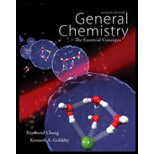
Concept explainers
(a)
Interpretation: Isoelectronic ion of alkaline earth metal with
Concept Introduction:
Alkaline earth metal in the periodic table is also known as Group 2A and contains 2 valence electrons. The outer electronic configuration of Group 2A is
If two or more different chemical species having same number of valence electrons are known as isoelectronic species
(b)
Interpretation: An anion with a −3 charge that is isoelectronic with
Concept Introduction:
Alkaline earth metal in the periodic table is also known as Group 2A and contains 2 valence electrons. The outer electronic configuration of Group 2A is
If two or more different chemical species having same number of valence electrons are known as isoelectronic species
(c)
Interpretation: An ion with a +2 charge that is isoelectronic with
Concept Introduction:
If two or more different chemical species having same number of valence electrons are known as isoelectronic species
Want to see the full answer?
Check out a sample textbook solution
Chapter 8 Solutions
General Chemistry
- . A.Propose a synthesis for propylbenzene which avoids the problems of direct Friedel-Crafts alkylation. B. Consider the reaction below to answer the following questions. A B C NO2 Febr Brz D The Lewis acid catalyst in the reaction is: a. The nucleophile in the reaction is: b. C. d. This reaction proceeds Draw the structure of product D. (faster or slower) than benzene.arrow_forwardConsider the reaction below to answer the following questions. HOCH CHOH На A B C D H₂Oarrow_forwardConsider the structures below to answer the following questions. A. Indicate the most acidic hydrogens in each of the molecules. OH CH-H CH₂C-H H&C མིངྒཱའི B. Rank the molecules above in order of increasing acidity (least acidic to most acidic). a. III, II, I b. II, III, I C. I, II, III d. II, I, IIIarrow_forward
- Consider the reaction below to answer the following questions. H H+ A B CH₂OH 5% NaOCH, CH₂OH A. Which carbonyl compound functions as the electrophile in this reaction? B. Draw the structure of the enolate ion that is generated during the course of this reaction. C. This reaction is an example of: a. a mixed Claisen condensation. b. C. d. a Dieckman condensation. a Michael reaction. a mixed aldol reaction.arrow_forwardGive the major organic product(s) of each of the following reactions or sequences of reactions. Show all relevant stereochemistry. [two only] CH3O (11 HC-C-C-CH3 A. CH3 12. NaOHarrow_forwardDiethyl malonate can be prepared by the following reaction sequence. Draw the structures of each of the missing intermediates in the boxes provided. 17 1. Br PBr H&C OH 2 H₂O CH3CH₂OH На NaCN H₂SO4 NC. CH CH₂OH на H₂O, heat CH₂ OCHCH3 ཝསི། ཡིཀྑཱམུདྡྷནྟ CH₂ OEtarrow_forwardThe reaction of a carboxylic acid with an alcohol in the presence of acid is termed Fischer esterification. OH + CH₂OH На B C A. The nucleophile in this reaction is B. Compound C functions as a. a base scavenger b. a solvent C. a catalyst d. a neutralizer C. Fischer esterification is an example of: . a. nucleophilic acyl addition b. nucleophilic acyl substitution c. nucleophilic acyl elimination d. nucleophilic acyl rearrangement in this reaction.arrow_forwardA highly useful and general method for the synthesis of alcohols is the addition of Grignard reagents to carbonyl compounds. Show what Grignard reagent and what carbonyl compound you would start with to prepare each alcohol below. List all possibilities. OH C-CH2CH3 CH3arrow_forwardRank the following groups of compounds from most acidic (1) to least acidic (4). Place the number corresponding to the compound's relative rank in the blank below the structure. NO2 a. b. NO2 NO2 CH,CH,CH,CH,OH. CHCHCH-CHOH. CH-CH-CH,CH;OH CH-CHCH-CH-OH OH OH CH₂OH COH ဒီ ပုံ ပုံ H&C CN CN ĆNarrow_forwardGiven the major organic product(s) of each of the following reactions. If none is predicted, write "N.R." answer] a. CHỊCH, CHẤT AIC13 H b. 0 Cl₂ HC- NHOCH3 FeCl3arrow_forwardGive the major organic product(s) for each of the following reactions or sequences of reactions. Show all relevant stereochemistry [2 ONLY]. A -CH2COOH 1. LIAIH THF, heat 2 HO B. C. CH₂Br Br 1. NaCN, acetone 2 H₂O, heat 1. Mg ether 3 HO Z CO₂arrow_forwardWhat is the order of increasing acidity for the following compounds? (least to most) [2 ONLY] A. COOH COOH COOH COOH 6666 a. IV, I, III, II b. III, II, I, IV с. II, III, I, IV d. III, II, IV, I slingoros CH3 IV woled noise bizarrow_forwardarrow_back_iosSEE MORE QUESTIONSarrow_forward_ios
 ChemistryChemistryISBN:9781305957404Author:Steven S. Zumdahl, Susan A. Zumdahl, Donald J. DeCostePublisher:Cengage Learning
ChemistryChemistryISBN:9781305957404Author:Steven S. Zumdahl, Susan A. Zumdahl, Donald J. DeCostePublisher:Cengage Learning ChemistryChemistryISBN:9781259911156Author:Raymond Chang Dr., Jason Overby ProfessorPublisher:McGraw-Hill Education
ChemistryChemistryISBN:9781259911156Author:Raymond Chang Dr., Jason Overby ProfessorPublisher:McGraw-Hill Education Principles of Instrumental AnalysisChemistryISBN:9781305577213Author:Douglas A. Skoog, F. James Holler, Stanley R. CrouchPublisher:Cengage Learning
Principles of Instrumental AnalysisChemistryISBN:9781305577213Author:Douglas A. Skoog, F. James Holler, Stanley R. CrouchPublisher:Cengage Learning Organic ChemistryChemistryISBN:9780078021558Author:Janice Gorzynski Smith Dr.Publisher:McGraw-Hill Education
Organic ChemistryChemistryISBN:9780078021558Author:Janice Gorzynski Smith Dr.Publisher:McGraw-Hill Education Chemistry: Principles and ReactionsChemistryISBN:9781305079373Author:William L. Masterton, Cecile N. HurleyPublisher:Cengage Learning
Chemistry: Principles and ReactionsChemistryISBN:9781305079373Author:William L. Masterton, Cecile N. HurleyPublisher:Cengage Learning Elementary Principles of Chemical Processes, Bind...ChemistryISBN:9781118431221Author:Richard M. Felder, Ronald W. Rousseau, Lisa G. BullardPublisher:WILEY
Elementary Principles of Chemical Processes, Bind...ChemistryISBN:9781118431221Author:Richard M. Felder, Ronald W. Rousseau, Lisa G. BullardPublisher:WILEY





